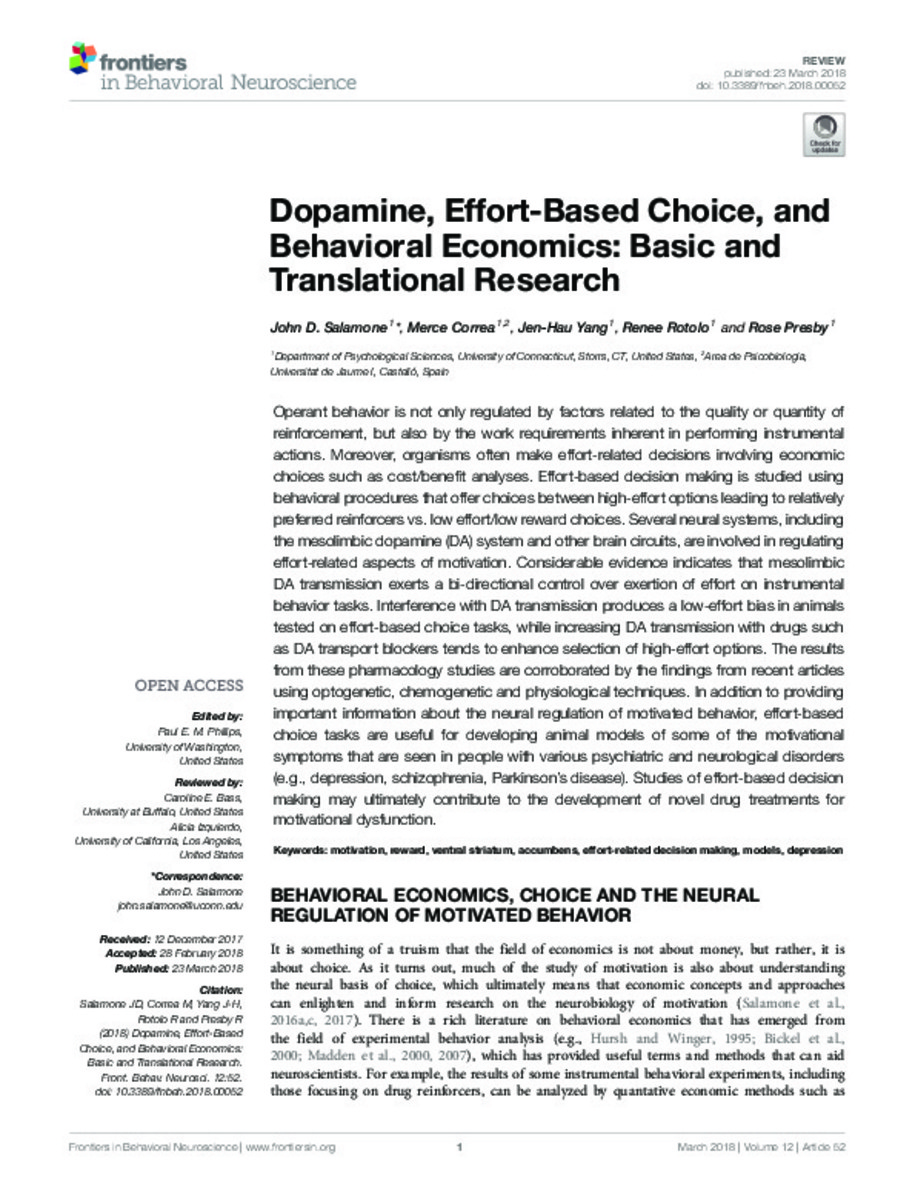Mostrar el registro sencillo del ítem
Dopamine, Effort-Based Choice, and Behavioral Economics: Basic and Translational Research
| dc.contributor.author | Salamone, John | |
| dc.contributor.author | Correa, Merce | |
| dc.contributor.author | Yang, Jen-Hau | |
| dc.contributor.author | Rotolo, Renee | |
| dc.contributor.author | Presby, Rose | |
| dc.date.accessioned | 2018-05-15T12:39:43Z | |
| dc.date.available | 2018-05-15T12:39:43Z | |
| dc.date.issued | 2018-03 | |
| dc.identifier.citation | SALAMONE, John D.; CORREA SANZ, Mercé; YANG, Jen-Hau; ROTOLO, Renee; PRESBY, Rose. (2018). Dopamine, Effort-Based Choice, and Behavioral Economics: Basic and Translational Research. Frontiers in Behavioral Neuroscience, v. 12, | ca_CA |
| dc.identifier.uri | http://hdl.handle.net/10234/174688 | |
| dc.description.abstract | Operant behavior is not only regulated by factors related to the quality or quantity of reinforcement, but also by the work requirements inherent in performing instrumental actions. Moreover, organisms often make effort-related decisions involving economic choices such as cost/benefit analyses. Effort-based decision making is studied using behavioral procedures that offer choices between high-effort options leading to relatively preferred reinforcers vs. low effort/low reward choices. Several neural systems, including the mesolimbic dopamine (DA) system and other brain circuits, are involved in regulating effort-related aspects of motivation. Considerable evidence indicates that mesolimbic DA transmission exerts a bi-directional control over exertion of effort on instrumental behavior tasks. Interference with DA transmission produces a low-effort bias in animals tested on effort-based choice tasks, while increasing DA transmission with drugs such as DA transport blockers tends to enhance selection of high-effort options. The results from these pharmacology studies are corroborated by the findings from recent articles using optogenetic, chemogenetic and physiological techniques. In addition to providing important information about the neural regulation of motivated behavior, effort-based choice tasks are useful for developing animal models of some of the motivational symptoms that are seen in people with various psychiatric and neurological disorders (e.g., depression, schizophrenia, Parkinson’s disease). Studies of effort-based decision making may ultimately contribute to the development of novel drug treatments for motivational dysfunction. | ca_CA |
| dc.format.extent | 13 p. | ca_CA |
| dc.format.mimetype | application/pdf | ca_CA |
| dc.language.iso | eng | ca_CA |
| dc.publisher | Frontiers Media | ca_CA |
| dc.relation.isPartOf | Frontiers in Behavioral Neurioscience (2018), v. 12 | ca_CA |
| dc.rights | Atribución 4.0 Internacional | * |
| dc.rights.uri | http://creativecommons.org/licenses/by-sa/4.0/ | * |
| dc.subject | Motivation | ca_CA |
| dc.subject | Reward | ca_CA |
| dc.subject | Ventral striatum | ca_CA |
| dc.subject | Accumbens | ca_CA |
| dc.subject | Effort-related decision making | ca_CA |
| dc.subject | Models | ca_CA |
| dc.subject | Depression | ca_CA |
| dc.title | Dopamine, Effort-Based Choice, and Behavioral Economics: Basic and Translational Research | ca_CA |
| dc.type | info:eu-repo/semantics/article | ca_CA |
| dc.identifier.doi | https://doi.org/10.3389/fnbeh.2018.00052 | |
| dc.relation.projectID | Much of the work cited in this review was supported by grants to JDS from the US NIH/NIMH R03MH112984, Shire and Prexa, and to MC from PSI2015-68497-R grant | ca_CA |
| dc.rights.accessRights | info:eu-repo/semantics/openAccess | ca_CA |
| dc.relation.publisherVersion | https://www.frontiersin.org/articles/10.3389/fnbeh.2018.00052/full | ca_CA |
| dc.type.version | info:eu-repo/semantics/publishedVersion | ca_CA |
Ficheros en el ítem
Este ítem aparece en la(s) siguiente(s) colección(ones)
-
PSB_Articles [1310]
Articles de publicacions periòdiques








